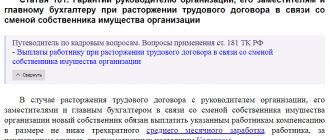Article 160. Work in which the use of women’s labor is prohibited
It is prohibited to use women's labor in heavy work and in work with hazardous working conditions, as well as in underground work (except for some underground work (non-physical work or work in sanitary and household services).
The list of heavy work and work with hazardous working conditions, in which the use of women’s labor is prohibited, is approved in the manner prescribed by law.
Women are prohibited from carrying and moving heavy objects that exceed the limits established for them.
OCCUPATIONAL SAFETY FOR WOMEN AND MINORS
The Constitution of the DPR at the highest legislative level established the equality of rights of women and men. At the same time, labor legislation, taking into account the physiological characteristics of a woman’s body, the interests of protecting motherhood and childhood, establishes special norms regarding labor protection and women’s health.
In accordance with part one of Article 17 of the DPR Law “On Labor Protection” (hereinafter referred to as the Law), it is prohibited to engage women in heavy work and work with harmful and (or) dangerous working conditions, as well as underground work, except for some underground work (non-physical work or work on sanitary, household, medical services).
The legislation prohibits the involvement of women in work related to lifting and moving heavy loads manually, exceeding the maximum standards established for them, unless otherwise established by regulatory legal acts of the Donetsk People's Republic.
It is important to note that the Labor Code of Ukraine (LLC), which is in force on the territory of the republic until the adoption of its own and in a version that does not contradict the Constitution of the Donetsk People's Republic, does not allow the involvement of women in work at night, with the exception of those sectors of the national economy where this is caused by a special need and is permitted as a temporary measure.
The labor protection legislation of the Donetsk People's Republic pays significant attention to providing benefits to pregnant women and women with children under three years of age.
Women with children aged three to fourteen years or disabled children cannot be required to work overtime or be sent on business trips without their consent.
It is prohibited to refuse to hire women and reduce their wages for reasons related to pregnancy or the presence of children under the age of three, and for single mothers - if they have a child under the age of fourteen or a disabled child.
If the specified categories of women are refused employment, the owner or a body authorized by him is obliged to inform them of the reasons for the refusal in writing. Refusal to hire may be appealed in court.
Based on Article 184 of the Labor Code, the dismissal of pregnant women and women with children under three years of age, single mothers with a child under fourteen years of age or a disabled child at the initiative of the owner or his authorized body is not allowed, except in cases of complete liquidation of the enterprise, institutions, organizations, when dismissal with mandatory employment is allowed.
Mandatory employment of these women is also carried out in cases of their dismissal after the end of a fixed-term employment contract. For the period of employment, they retain the average salary, but no more than three months from the date of expiration of the fixed-term employment contract.
Our young state takes into account certain physical, physiological and other characteristics of minors and takes care of the health of the younger generation, having provided for this at the legislative level by the DPR Law “On Labor Protection.”
Thus, part four of Article 17 of the Law stipulates that persons under eighteen years of age are involved in work only after a preliminary medical examination and subsequently, until they reach eighteen years of age, are subject to mandatory medical examination in accordance with the legislation of the DPR.
It should be noted that, on the basis of Article 24 of the Law, the employer is obliged to provide financing at his own expense and organize preliminary (upon entry to work and only by decision and direction of the employer) and periodic medical examinations of employees engaged in heavy work, work with hazardous or hazardous working conditions, annual compulsory medical examination of persons under the age of 21.
It is not permitted to employ persons under sixteen years of age. With the consent of one of the parents or the person who replaces him, as an exception, persons over fifteen years of age may be hired.
To prepare young people for productive work, it is allowed to employ students of secondary schools, vocational schools and secondary specialized educational institutions to perform light work that does not harm health and does not interfere with the learning process, in their free time from school, after they reach the age of fourteen, with the consent of one from the parents or the person who replaces him.
Thus, in accordance with part five of Article 17 of the Law, it is not allowed to engage persons under eighteen years of age to perform heavy work and work with harmful and (or) dangerous working conditions, underground and mining work.
It is prohibited for minors to lift and move by hand weights that exceed the limits established for them.
It is also prohibited to allow minors under 15 years of age to engage in long-term work lifting and moving loads. The total work of minors with loads should not exceed a third of the working day or shift.
It is prohibited to engage workers under eighteen years of age in night and overtime work, work on holidays and weekends, unless otherwise established by the legislation of the Donetsk People's Republic.
According to Article 12 of the DPR Law “On Leaves,” persons under the age of 18 are provided with annual basic and additional paid leaves at the request of the employee at a time convenient for him.
Dismissal of employees under eighteen years of age at the initiative of the owner or a body authorized by him is permitted, in addition to compliance with the general dismissal procedure, only with the consent of the district (city) children's service.
Article 163.1. Additional day off
To care for disabled children and people with disabilities from childhood until they reach the age of 18, one of the working parents (guardian, trustee) is provided with four additional paid days off per month, which can be used by one of the named persons or divided among themselves at their discretion . Payment for each additional day off is made in the amount of daily earnings from the Social Insurance Fund of the Russian Federation. If one of the parents does not work, the working parent is provided with two additional days off per month with payment under the same conditions.
Women working in rural areas are provided, at their request, with one additional day off per month without pay.
Article 165. Maternity leave
Women are granted maternity leave of seventy (in the case of multiple pregnancies, eighty-four) calendar days before childbirth and seventy (in the case of complicated births - eighty-six, for the birth of two or more children - one hundred and ten) calendar days after childbirth.
Maternity leave is calculated cumulatively and is provided to a woman completely regardless of the number of days actually used before giving birth.
Article 167. Parental leave
At the request of women, we provide them with maternity leave until they reach the age of three.
Parental leave until the child reaches the age of three can be used in full or in parts by the child’s father, grandmother, grandfather or other relatives, guardian who actually care for the child.
At the request of the woman and the persons specified in part two of this article, while they are on maternity leave, they can work part-time or at home.
Parental leave is counted towards the total and continuous work experience, as well as into the work experience in the specialty (except for cases of granting a pension on preferential terms).
The time of parental leave is not counted towards the length of service giving the right to subsequent annual paid leave.
During parental leave, the place of work (position) is maintained.
What laws of the Russian Federation regulate the rights of pregnant women
There are several pieces of legislation that regulate labor relations and various processes related to pregnant women.
The main basis for labor relations is laid down in the Labor Code of the Russian Federation. Section 12, Part 4 of the Labor Code of the Russian Federation regulates the list of labor features for different categories of citizens. The work of women and persons who have just given birth is defined in Chapter 41 under the following articles:
- 254 - transfer of pregnant women, as well as persons with a child under 1.5 years of age, to a lighter schedule or work;
- 255 — maternity leave;
- 256 - child care up to 3 years old;
- 258 - break for feeding;
- 259 - a list of guarantees during pregnancy and lactation during business trips, overtime work, night shifts, as well as work on weekends and holidays;
- 260 - guarantees for the priority distribution of annual leave for a woman during pregnancy or childbirth;
- 261 - list of guarantees upon termination of employment relationships;
- 262 (including 262.1) - extraordinary days off and the procedure for granting leave to a parent with a disabled child.
Additionally, there is Federal Law Regulation No. 255-FZ dated December 29, 2006 (social insurance with temporary disability and maternity), which contains Chapter 3, which defines benefits for childbirth or pregnancy, as well as Chapter 4, which establishes the procedure for assigning various payments.
Another important law is Federal Law 05/19/1995 N-FZ, which establishes state benefits for persons with children.
Article 254 of the Labor Code of the Russian Federation “Transfer to another job of pregnant women and women with children under the age of one and a half years”
Article 255 of the Labor Code of the Russian Federation “Maternity leave”
Article 256 of the Labor Code of the Russian Federation “Parental leave”
Article 258 of the Labor Code of the Russian Federation “Breaks for feeding the child”
Article 259 of the Labor Code of the Russian Federation “Guarantees for pregnant women and persons with family responsibilities when sent on business trips, involved in overtime work, work at night, weekends and non-working holidays”
Article 260 of the Labor Code of the Russian Federation “Guarantees for women in connection with pregnancy and childbirth when establishing the order of provision of annual paid leave”
Article 261 of the Labor Code of the Russian Federation “Guarantees for a pregnant woman and persons with family responsibilities upon termination of an employment contract”
Article 262 of the Labor Code of the Russian Federation “Additional days off for persons caring for disabled children and women working in rural areas”
Article 262.1 of the Labor Code of the Russian Federation “The order of granting annual paid leave to persons raising disabled children”
Federal Law of December 29, 2006 No. 255-FZ “On compulsory social insurance in case of temporary disability and in connection with maternity”
Federal Law of May 19, 1995 No. 81-FZ “On state benefits for citizens with children”
Rights and guarantees
According to the Labor Code of the Russian Federation, there is an established list of guarantees and rights that apply to women in this situation. Rights and guarantees:
- it is impossible to refuse employment without specifying a reason;
- paid maternity leave;
- dismissal is prohibited;
- annual leave is not provided according to schedule;
- no business trips;
- the work schedule has a shortened version;
- transfer to easier working conditions.
Important! Receiving part-time work can only be done at the initiative of the employee, that is, management does not have the right to establish a light schedule without the consent of the employee.
Among the important points:
- annual leave can be added to maternity leave;
- the article does not provide for a probationary period;
- Any refusal of employment must be accompanied by a written form stating the reasons.
Read also: How to check an online store for fraud
Any employer must take into account all the rights and guarantees of individuals. Otherwise, fines and sanctions may follow both in relation to managers and in relation to the organization. Additionally, inspections by the labor inspectorate will be carried out.
Article 70 of the Labor Code of the Russian Federation “Test upon hiring”
Employer Responsibilities
An employer has several responsibilities.
For example, according to the article of the Labor Code of the Russian Federation, he must revise the length of the working day upon the written request of a pregnant employee. It is impossible to refuse a transition to part-time work, even if it is necessary to revise the work schedule of the entire organization. The employer must fulfill all obligations and take into account all rights and guarantees that are provided by law. Forbidden:
- involvement in night work. This is regulated by an article of the Labor Code of the Russian Federation;
- it is impossible to call to work on a weekend or holiday in accordance with Article 112 of the Labor Code of the Russian Federation;
- According to the article, overtime work is not possible;
- Keeping a watch is also prohibited. This is stated in Article 298.
The employer's primary responsibility will be to comply with all rules and regulations. He is not obliged to comply with points not prescribed by law.
Article 93 of the Labor Code of the Russian Federation “Part-time work”
Article 96 of the Labor Code of the Russian Federation “Night work”
Article 112 of the Labor Code of the Russian Federation “Non-working holidays”
Article 99 of the Labor Code of the Russian Federation “Overtime work”
Article 298 of the Labor Code of the Russian Federation “Restrictions on work on a rotational basis”
Article 168. Leave for employees who have adopted a child
Employees who have adopted a child are granted leave for the period from the date of adoption until the expiration of seventy days from the date of birth of the adopted child, and when adopting two or more children - one hundred and ten days from the date of their birth. The procedure for granting this leave is determined by the Government of the Russian Federation.
At the request of employees who have adopted a child, they are granted parental leave until the child reaches the age of three years.
In case of adoption of a child by both spouses, these leaves are granted to one of the spouses at their discretion.
Working hours for pregnant women according to the Labor Code
According to the Labor Code, an employee has the right to contact management with a correctly completed application to switch to a shortened working day. This can be done at any time of the year.
When hiring, part-time work can also be agreed upon immediately.
To switch to a regular schedule, you must contact your manager in the usual manner, that is, write an application requesting a transfer to regular working hours. The authorities cannot refuse this request.
Rights of pregnant women while at work
According to Articles 251-264 of the Labor Code of the Russian Federation, women during their working life receive a number of rights that can be used if desired. This includes:
- reduction of working hours. It doesn’t matter whether the hours will be reduced from the beginning of the working day or at the end of it. The norm for reduction is 1-2 hours. There may be less, but there is no more;
- vacation pay is paid in full regardless of the time of year and length of service, that is, an employee can work only a few months, but the vacation pay will be full;
- preservation of position and workplace. When an employee goes on maternity leave, this vacancy is assigned, which cannot be assigned full-time to a third party, removed from the staffing table, or reduced. The only legal option would be to transfer the employee to another position, but the consent of the pregnant woman must be obtained;
- There is no probationary period for pregnant women. In a probationary period, an employee can be dismissed only on grounds of unsuitability. In other cases, the position is assigned to a woman;
- the entire dismissal procedure is not standard, since it is impossible to dismiss a woman during pregnancy by decision of the manager. The only legal possibility would be a serious disciplinary offense, that is, dismissal occurs under the article. Another legal option would be a complete reduction in staff as a result of liquidation of the organization. In case of partial reduction of any option, the position remains with the employee.
Important! There is one more important point. If a contract or employment agreement ends during maternity leave, it is automatically extended.
Article 251 of the Labor Code of the Russian Federation “Features of labor regulation”
Read also: Civil Defense Law
Article 264 of the Labor Code of the Russian Federation “Guarantees and benefits for persons raising children without a mother”
Time standards and reduction of its duration
Reducing labor time can be expressed in several ways. Options:
- the day or shift is shortened. The number of days themselves does not change, but the length of the working day itself is reduced to two hours. For example, with an 8-hour working day, a 6-hour period is established;
- the work week is shortened. The length of the day remains the same, but the week itself becomes shorter. Example, work from Tuesday to Thursday inclusive instead of Monday to Friday;
- reduce both the day and the week. For example, an employee will work from Monday to Thursday for 6 hours.
There are several options for reduction, but you must follow the rule that the day can be shortened by a maximum of two hours.
Establishment of part-time work
A partial day can only be established using a special procedure. If you just want to, this is impossible, since you will need to complete the required documentation. Procedure:
- obtaining from the antenatal clinic or from the supervising doctor a certificate that fully specifies information about the employee’s pregnancy;
- writing a statement to the employer (immediate supervisor). The document specifies all aspects, including shortening the working day or receiving an additional day off. The duration of such period of work must be indicated;
Sample application for part-time work - the application and certificate are sent to the HR department (in its absence, directly to the manager, including the possibility of sending it by registered mail). The application can be written in two copies so that both versions have a signature. Such a measure may be required to avoid controversial situations;
- familiarization with the order and signature;
- an additional agreement is signed, which is attached to the regular employment agreement or contract. One copy remains in the employee’s hands.
If your boss refuses to shorten the day due to pregnancy, you can contact the labor inspectorate, as well as the prosecutor's office. But you will need evidence, which will be duplicates of documents.
Important! With reduced working hours, wages are calculated according to the hours worked, that is, the salary will be less in proportion to the time worked. This fact must be reflected in the additional agreement, which is drawn up when the time is reduced.
The actual hours worked according to the new schedule, as well as the time of mandatory medical examination, are entered into the timesheet.
When can you go on maternity leave?
According to a number of provisions of Part 1 of Article 255, a pregnant employee, upon application and sick leave, is entitled to leave, which is paid. A certificate of incapacity for work is issued according to the regulations of the Ministry of Health and Social Development, in particular according to Order No. 624n dated June 29, 2011. In accordance with this act, the issuance should be made at 30 weeks in case of a normal pregnancy and at 28 weeks in case of multiple pregnancy.
The maternity period consists of several segments. Before giving birth, the duration of leave is 70 calendar days. An exception is a multiple pregnancy of 84 days. If multiple pregnancy was determined during the birth itself, then the extension is carried out for 54 days.
Time frame after birth:
- 70 days - usual;
- 86 days - with a complication;
- 110 days - birth of two or more children.
The duration of the vacation is total, that is, there is no connection with the days spent before the birth itself.
Order of the Ministry of Health and Social Development of Russia dated June 29, 2011 N 624n “On approval of the Procedure for issuing certificates of incapacity for work”
What are the benefits at work?
According to Federal Law No. 255, receiving maternity benefits is possible only if you have insurance. The size of the payment depends on average earnings. From the 30th week of pregnancy, a woman claims the following payments:
- one-time federal assistance in the amount of 613 rubles;
- regional allowance - 600 rubles;
- at the birth of a child - a one-time payment of 16,350 rubles;
- the birth of a second child and subsequent ones - maternity capital in the form of a certificate.
The size of the certificate is 454 thousand. Also, for the second and third child there are additional monthly payments until the child turns 3 years old.
Important! If a woman goes back to work after giving birth, child care benefits are not paid.
The average salary is calculated according to the standard, that is, the amount received for a certain period is divided by the number of calendar days. We receive the amount per day.
Read also: Law on elections in the Russian Federation
The billing period does not include vacations, periods of incapacity for work, and temporary release from office.
Article 169. Breaks for feeding a child
Women with children under the age of one and a half years are provided, in addition to the general break for rest and food, with additional breaks for feeding the child.
These breaks are provided at least every three hours, lasting at least thirty minutes each. If there are two or more children under the age of one and a half years, the duration of the break is set at least an hour.
Breaks for feeding a child are included in working hours and are paid according to average earnings.
The timing and procedure for providing breaks are established by the administration together with the relevant elected trade union body of the enterprise, institution, organization, taking into account the wishes of the mother.






